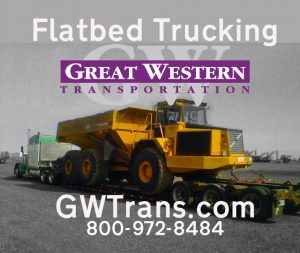Generally speaking, cargo is transported by trucking companies hauling dry van trailers, refrigerated trailers, and flatbeds. They can easily maneuver roadways, through heavy traffic and in inclement weather. Transporting extremely heavy, tall, or wide cargo is a much different story. Not only do these loads require specialized equipment, their routes are severely restricted. It is vitally important that heavy haul trucking companies perform thorough route planning before the haul begins.
Weight Restrictions
The Federal Highway Administration mandates the maximum weight of any vehicle using the roadways. These limits are: 80,000 pounds of gross vehicle weight, 20,000 pounds of single axle weight and no more than 34,000 pounds of tandem axle weight. In addition, weight limits for bridges and roads may be in effect for certain local jurisdictions. Seasonal conditions also come into play in some geographic regions. Loads that exceed any of these weight restrictions are subject to approval and additional permits before they can be transported.
Height Issues
On occasion, a load that exceeds the clearance requirements of bridges, overpasses and other structures must be transported. For example, an enormous crane that is needed for a major construction project in an urban environment. It may be necessary to divert traffic from the area, disconnect power lines, and clear the area of personal vehicles and pedestrians. This takes the concentrated effort and cooperation of city officials, utility companies, the police and the transportation company. However, the process must be planned well in advance to avoid any issues.
Very Wide Loads
The maximum width of a commercial motor vehicle allowed on the roadways, according to Federal law is 102 inches, or 8′ 6”. Although there are exceptions to this rule, such as emergency response vehicles and farm equipment, this pertains to all cargo containers, regardless of type. Transporting extremely wide loads that exceed these federal limits requires special permits. These are obtained through the state that the load originates from as well as states it subsequently travels through. Failure to plan ahead will result in costly delays, and potential fines.
While there are many restrictions placed on the massive loads we call heavy haul, it’s a rewarding enterprise. There’s no doubt that it’s an integral part of many industries, most notably, the construction industry. Logistics companies that specialize in heavy haul understand that compliance with regulations ensures the safety of the cargo, as well as the people and the environment it encounters.





